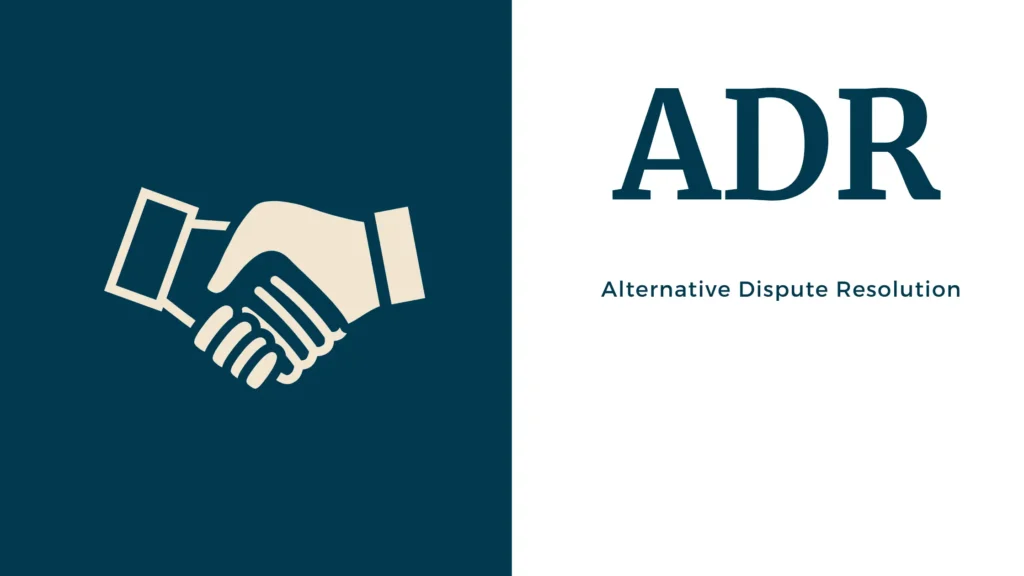


Alternative Dispute Resolution (ADR) involves using various techniques to settle legal disputes outside of court. These techniques include negotiation, mediation, arbitration, and other forms of conflict resolution. The popularity of ADR has risen in recent years due to its ability to resolve disputes quickly, efficiently, and cost-effectively. In this blog post, we will examine the advantages and disadvantages of using alternative dispute resolution in business law.
Businesses often choose alternative dispute resolution (ADR) to resolve legal disputes in business law as it saves time and money. Traditional litigation can be a costly and time-consuming process, which is why businesses are opting for ADR methods like mediation and arbitration.
Delays are common in litigation, as the court system is often overwhelmed with cases. This can be detrimental to businesses that need to resolve disputes quickly to continue their operations. On the other hand, ADR methods are typically faster and can be completed in a matter of months. This enables businesses to resolve disputes efficiently, avoiding prolonged delays that could negatively impact their bottom line.
ADR methods can also be much more cost effective than traditional litigation. Litigation can be expensive, with legal fees, court costs, and other expenses adding up quickly. In contrast, ADR proceedings are often less expensive, with lower legal fees and fewer court costs. This can be a significant advantage for businesses trying to manage expenses while still resolving disputes in a fair and effective manner.
In contrast to traditional litigation, ADR empowers the parties involved in the dispute with greater control over the outcome. Instead of having a judge or jury decide on the settlement terms, the parties themselves can negotiate and agree on the resolution. This flexibility and customization make ADR an ideal choice, especially when the parties have an ongoing business relationship.
The collaborative process allows them to craft a solution that satisfies their respective needs and preserves their business relationship, which may not be possible with a court decision. Moreover, ADR encourages creativity and innovation, as the parties can devise unique solutions that suit their particular situation. In short, ADR provides greater control and flexibility to the parties involved, leading to more effective and satisfactory dispute resolution.
ADR provides the benefit of privacy and confidentiality, which is generally not available in traditional litigation. ADR proceedings take place in a private setting, and the details of the dispute are not made public. This is particularly important for businesses that want to protect their reputation or keep sensitive information confidential. In contrast, traditional litigation makes the details of the case part of the public record, which can be detrimental to a business. ADR allows the parties to keep the details of the dispute confidential, which can help protect their interests and prevent negative publicity.
In addition, the confidentiality of ADR proceedings can encourage parties to be more open and honest in their negotiations, which can lead to a more effective and mutually beneficial resolution of the dispute. The parties can be more willing to share sensitive information and explore creative solutions when they know that the details of the dispute will not be made public. This can lead to a more productive and efficient resolution of the dispute, which is beneficial for all parties involved.
ADR offers flexibility and customization to the specific needs of the parties involved. The parties have the freedom to choose the dispute resolution method that best suits their situation, be it negotiation, mediation, or arbitration. Each method has its advantages and disadvantages, and the parties can select the one that is most suitable for them.
The flexibility of ADR enables the parties involved to choose the method of dispute resolution that is most suitable for their particular situation. For instance, negotiation can quickly and informally resolve a dispute, while mediation is suitable for situations where the parties aim to maintain their relationship after resolving the dispute. Arbitration is often a preferable option when the parties want a neutral third party to make a decision but do not want to go through the costly and time-consuming process of a court trial. This flexibility empowers the parties to select the method that aligns best with their preferences and needs, resulting in a more efficient and effective resolution of the dispute.
ADR does not guarantee success, which is one of its primary drawbacks. Even though ADR is often quicker and cheaper than traditional litigation, there is no guarantee that the parties will reach a settlement, despite their best efforts and the involvement of ADR professionals.
If the parties are unable or unwilling to negotiate or compromise, ADR may not succeed. For ADR to work, both parties must cooperate and be willing to find common ground to reach a settlement. However, if one or both parties are unwilling to negotiate or compromise, it can be challenging to reach a settlement.
Additionally, ADR can fail in cases where disputes are too complex or contentious to be resolved through ADR. Disputes that involve technical or specialized issues may require a detailed understanding of the law or industry-specific knowledge. Personal or emotional issues may also make it difficult to find common ground.
Furthermore, ADR may not succeed in cases where one or both parties are unwilling to make the necessary concessions to reach a settlement. If one or both parties believe they have a strong case and are not willing to settle for less than what they think they deserve, it may be challenging to reach an agreement.
If the parties are unable to reach a settlement through ADR, they may have limited legal recourse, which can be a significant drawback. Pursuing traditional litigation to resolve their dispute can be a lengthy and expensive process that can significantly delay the resolution of the dispute. Small businesses or individuals who may not have the financial resources to pursue a court case may find the cost of litigation prohibitive.
Moreover, going to court can be a risky proposition, as the parties relinquish a significant amount of control over the outcome of the dispute. A judge or jury will make the final decision, which may not be in the best interests of either party. The decision may be based on legal technicalities rather than the underlying merits of the case, which can be frustrating for the parties involved.
In addition, the outcome of the case may not be a win-win for both parties, and there may be no chance of a compromise. One party may emerge as the clear winner, leaving the other party with nothing. Moreover, the details of the dispute become part of the public record, and anyone can access them, which can be detrimental to businesses or individuals who want to keep their information confidential.

One potential drawback of Alternative Dispute Resolution (ADR) is that the decisions made in ADR proceedings do not carry the same legal weight as court decisions. ADR is a private process, and the decisions made are not binding legal precedents. This lack of precedent can be a disadvantage in some situations, particularly where the parties are concerned about the legal implications of their dispute.
In contrast to ADR, court decisions are typically based on established legal principles and precedents that have been developed over time through the court system. These legal precedents provide guidance and clarity for future cases, ensuring consistency and predictability in the legal system. Parties can be assured that their case will be decided based on these established legal principles and precedents.
However, in ADR, decisions are not necessarily based on legal principles or precedents, but rather on the specific circumstances of the case and the preferences of the parties involved. This can make it difficult for parties to predict the outcome of their dispute or understand the legal implications of their decision.
Moreover, the lack of precedent in ADR can be a disadvantage in situations where the parties are concerned about setting a legal precedent that could be used against them in future cases. In court, parties can rely on established legal principles and precedents to support their case and protect their interests. In ADR, parties may need to rely on the expertise of the ADR professionals involved to guide them in their decision-making.
An imbalance of power between the parties involved in Alternative Dispute Resolution (ADR) can be a potential drawback of this process. This can happen when one party has significantly more power or resources than the other, allowing them to exert undue influence over the ADR proceedings.
The weaker party may feel pressured to accept a settlement that is not in their best interests, as they may not have the financial or legal resources to pursue their case through the court system. The more powerful party may also use its resources to hire a skilled and experienced ADR professional, putting the weaker party at a disadvantage.
To address this imbalance of power, it is essential to ensure that both parties have access to legal representation and that the ADR process is conducted fairly and impartially. An impartial ADR professional can help to ensure that both parties have an equal opportunity to present their case and negotiate a fair settlement.
It is also important to ensure that the terms of the ADR agreement are fair and reasonable and that both parties understand the implications of the agreement before agreeing to it. In cases where there is a significant power imbalance between the parties, a neutral third party may need to be brought in to facilitate the ADR process and ensure that it is conducted fairly and impartially.
Simplify Your Law Assignment With Our Easy-To-Follow Hacks – Read More On Our Blog https://mycollegeassignment.com/5-simple-hacks-to-help-you-with-the-back-breaking-law-assignment/
Stressed with Assignments? Get Expert Help Now – Visit https://subjectacademy.com/ now for Assignment Assistance!